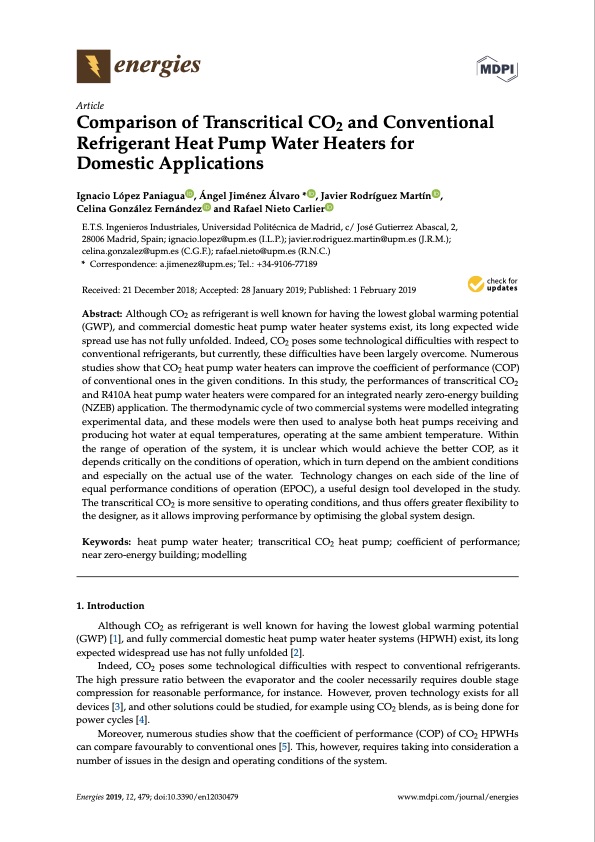
PDF Publication Title:
Text from PDF Page: 001
energies Article Comparison of Transcritical CO2 and Conventional Refrigerant Heat Pump Water Heaters for Domestic Applications Ignacio López Paniagua , Ángel Jiménez Álvaro * , Javier Rodríguez Martín , Celina González Fernández and Rafael Nieto Carlier E.T.S. Ingenieros Industriales, Universidad Politécnica de Madrid, c/ José Gutierrez Abascal, 2, 28006 Madrid, Spain; ignacio.lopez@upm.es (I.L.P.); javier.rodriguez.martin@upm.es (J.R.M.); celina.gonzalez@upm.es (C.G.F.); rafael.nieto@upm.es (R.N.C.) * Correspondence: a.jimenez@upm.es; Tel.: +34-9106-77189 Received: 21 December 2018; Accepted: 28 January 2019; Published: 1 February 2019 Abstract: Although CO2 as refrigerant is well known for having the lowest global warming potential (GWP), and commercial domestic heat pump water heater systems exist, its long expected wide spread use has not fully unfolded. Indeed, CO2 poses some technological difficulties with respect to conventional refrigerants, but currently, these difficulties have been largely overcome. Numerous studies show that CO2 heat pump water heaters can improve the coefficient of performance (COP) of conventional ones in the given conditions. In this study, the performances of transcritical CO2 and R410A heat pump water heaters were compared for an integrated nearly zero-energy building (NZEB) application. The thermodynamic cycle of two commercial systems were modelled integrating experimental data, and these models were then used to analyse both heat pumps receiving and producing hot water at equal temperatures, operating at the same ambient temperature. Within the range of operation of the system, it is unclear which would achieve the better COP, as it depends critically on the conditions of operation, which in turn depend on the ambient conditions and especially on the actual use of the water. Technology changes on each side of the line of equal performance conditions of operation (EPOC), a useful design tool developed in the study. The transcritical CO2 is more sensitive to operating conditions, and thus offers greater flexibility to the designer, as it allows improving performance by optimising the global system design. Keywords: heat pump water heater; transcritical CO2 heat pump; coefficient of performance; near zero-energy building; modelling 1. Introduction Although CO2 as refrigerant is well known for having the lowest global warming potential (GWP) [1], and fully commercial domestic heat pump water heater systems (HPWH) exist, its long expected widespread use has not fully unfolded [2]. Indeed, CO2 poses some technological difficulties with respect to conventional refrigerants. The high pressure ratio between the evaporator and the cooler necessarily requires double stage compression for reasonable performance, for instance. However, proven technology exists for all devices [3], and other solutions could be studied, for example using CO2 blends, as is being done for power cycles [4]. Moreover, numerous studies show that the coefficient of performance (COP) of CO2 HPWHs can compare favourably to conventional ones [5]. This, however, requires taking into consideration a number of issues in the design and operating conditions of the system. Energies 2019, 12, 479; doi:10.3390/en12030479 www.mdpi.com/journal/energiesPDF Image | Comparison of Transcritical CO2 and Conventional Refrigerant Heat Pump

PDF Search Title:
Comparison of Transcritical CO2 and Conventional Refrigerant Heat PumpOriginal File Name Searched:
energies-12-00479.pdfDIY PDF Search: Google It | Yahoo | Bing
CO2 Organic Rankine Cycle Experimenter Platform The supercritical CO2 phase change system is both a heat pump and organic rankine cycle which can be used for those purposes and as a supercritical extractor for advanced subcritical and supercritical extraction technology. Uses include producing nanoparticles, precious metal CO2 extraction, lithium battery recycling, and other applications... More Info
Heat Pumps CO2 ORC Heat Pump System Platform More Info
| CONTACT TEL: 608-238-6001 Email: greg@infinityturbine.com | RSS | AMP |